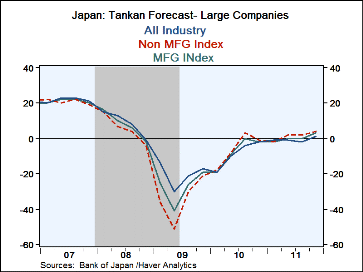 Global| Oct 03 2011
Global| Oct 03 2011Japan’s Tankan rebounds but remains short of its Q1 reading
Summary
Japan’s Tankan reading has risen from its recession lows and the outlook is up in Q3. While the rebound is the firm for large companies it is progressively more guarded as the size of the enterprise surveyed geos down. But the actual [...]
 Japan’s Tankan reading has risen from its recession lows and the outlook is up in Q3. While the rebound is the firm
for large companies it is progressively more guarded as the size of the enterprise surveyed geos down. But the actual
Tankan reading in Q3 at +2 exceeds the Q3 reading of -9 but comes up short on the Q1 level of +6.
Japan’s Tankan reading has risen from its recession lows and the outlook is up in Q3. While the rebound is the firm
for large companies it is progressively more guarded as the size of the enterprise surveyed geos down. But the actual
Tankan reading in Q3 at +2 exceeds the Q3 reading of -9 but comes up short on the Q1 level of +6.
The headline Tankan number is the one for large Manufacturing companies. For non-manufacturing there was a similar rebound too and again the Q3 reading fell short of the Q1 reading.
The all-industry outlook (forecast) for large enterprises rose to +3 in Q4 from zero in Q3 and -2 in Q1. For Medium-sized companies it rose to -7 for Q4 up from -13 in Q3 and better than the Q1 outlook of -15. For small companies the Q4 outlook improved to -18 from -24 in Q3 and -27 in Q1.
While there was improvement for companies of all sizes the largest enterprises are leading the outlook for improvement. Even though the current reading for large firms is below its Q1 level, the outlook has improved beyond its Q1 mark, a reading taken before disaster struck Japan.
The evidence is that despite its disasters and despite a subsequent run up in the value of the yen, Japan is continuing to improve. The deflation picture remains somewhat touchy. But the economic side shows that firms are improving and that they expected improvement to continue even in the face of continuing difficulties in Europe, with world growth and in key foreign exchange markets.
Robert Brusca
AuthorMore in Author Profile »Robert A. Brusca is Chief Economist of Fact and Opinion Economics, a consulting firm he founded in Manhattan. He has been an economist on Wall Street for over 25 years. He has visited central banking and large institutional clients in over 30 countries in his career as an economist. Mr. Brusca was a Divisional Research Chief at the Federal Reserve Bank of NY (Chief of the International Financial markets Division), a Fed Watcher at Irving Trust and Chief Economist at Nikko Securities International. He is widely quoted and appears in various media. Mr. Brusca holds an MA and Ph.D. in economics from Michigan State University and a BA in Economics from the University of Michigan. His research pursues his strong interests in non aligned policy economics as well as international economics. FAO Economics’ research targets investors to assist them in making better investment decisions in stocks, bonds and in a variety of international assets. The company does not manage money and has no conflicts in giving economic advice.






